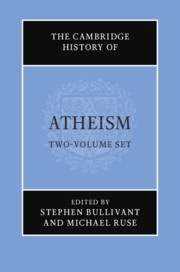Book contents
- The Cambridge History of Atheism
- The Cambridge History of Atheism
- Copyright page
- Dedication
- Contents
- Acknowledgments
- Contributors
- Introduction
- Part I Preliminaries
- Part II Atheisms in History
- Part III Reformation, Renaissance, Enlightenment
- Part IV Classical Modernity: Philosophical and Scientific Currents
- Part V Classical Modernity: Social and Political Currents
- 23 The French Revolution
- 24 Freethinkers, Atheists, and Anticlericals: Spanish American Struggles for Independence
- 25 Marx and Marxisms
- 26 Nineteenth-Century Russia
- 27 Secularism and Humanism
- 28 Bertrand Russell
- 29 Robert Ingersoll
- 30 Early Women’s Movement
- 31 Early African American Secularism
- Part VI Twentieth and Twenty-First Centuries: Intellectual and Artistic Currents
- Part VII Lived Atheism in the Twentieth- and Twenty-First Centuries: Case-Studies
- Part VIII Emerging Atheisms in the Twenty-First Century
- Part IX Conclusion
- Index
- References
24 - Freethinkers, Atheists, and Anticlericals: Spanish American Struggles for Independence
from Part V - Classical Modernity: Social and Political Currents
Published online by Cambridge University Press: 25 September 2021
- The Cambridge History of Atheism
- The Cambridge History of Atheism
- Copyright page
- Dedication
- Contents
- Acknowledgments
- Contributors
- Introduction
- Part I Preliminaries
- Part II Atheisms in History
- Part III Reformation, Renaissance, Enlightenment
- Part IV Classical Modernity: Philosophical and Scientific Currents
- Part V Classical Modernity: Social and Political Currents
- 23 The French Revolution
- 24 Freethinkers, Atheists, and Anticlericals: Spanish American Struggles for Independence
- 25 Marx and Marxisms
- 26 Nineteenth-Century Russia
- 27 Secularism and Humanism
- 28 Bertrand Russell
- 29 Robert Ingersoll
- 30 Early Women’s Movement
- 31 Early African American Secularism
- Part VI Twentieth and Twenty-First Centuries: Intellectual and Artistic Currents
- Part VII Lived Atheism in the Twentieth- and Twenty-First Centuries: Case-Studies
- Part VIII Emerging Atheisms in the Twenty-First Century
- Part IX Conclusion
- Index
- References
Summary
Works by Stephen Bullivant (2013) and Michael Ruse (2015) have made clear that defining ‘atheism’ can be a daunting task, given that it implies grappling with what authors understand by religion. In this sense, the following pages are in debt to the insights provided by Talal Asad (1993), Brent Nongbri (2013), and Wilfred Cantwell Smith (1962). Moreover, in most of the western world the process of secularization, understood as the historical course by which the civic, the economic, the political, and the social realms are separated from any religious subjugation or dependency, was largely absent by the end of the eighteenth century, when this examination starts.
- Type
- Chapter
- Information
- The Cambridge History of Atheism , pp. 445 - 464Publisher: Cambridge University PressPrint publication year: 2021



